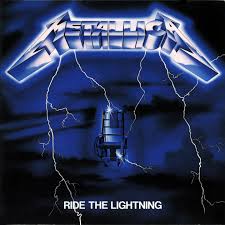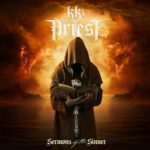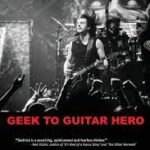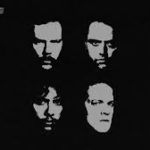Ten Thrash Ballads
Thrash metal is extremely technical music. Its practitioners are accomplished musicians who have spent years mastering their instruments. They shine in the context of fast, aggressive music, but sometimes speed obscures the nuances of their craft.
It’s little wonder that ballads soon crept into the repertoire of thrash bands. These slower songs provided a sense of dynamics that allowed musicians to shine without the hindrance of extreme distortion. Naturally most of these “ballads” became full-on thrashers before the song was over.
What follows are ten examples of the heaviest bands exploring the softer side of metal.
METALLICA – FADE TO BLACK
Somber acoustic guitars and a mournful guitar solo begin this timeless Metallica classic. A song of loss and hopelessness, dark overtones lend credence to a young Metallica playing with rare restraint.
https://www.youtube.com/watch?v=WLE7hcSgxlM
On the heels of Kill ‘Em All, the band took slack from purists that felt acoustic guitars had no place in thrash. Still, as the song builds in intensity, even detractors found themselves head-banging.
Loud riffs provide a counter-balance to the dire reflections of the verse. “Fade to Black” abounds with intensity as Kirk builds up phrases before letting loose a frenzied blur of pentatonic notes. The song ends as the needle heads into the dead wax, giving listeners a moment to reflect before flipping the record to side two.
ANTHRAX – ARMED AND DANGEROUS
For early Anthrax fans, “Armed and Dangerous” was their first exposure to Joey Belladonna. Released as an EP shortly before Spreading the Disease, the band chose that album’s sole ballad to introduce the world to their new singer.
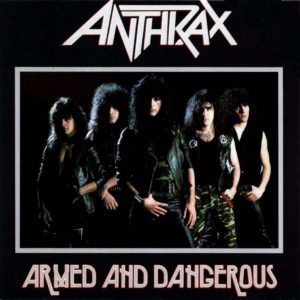
Anthrax was a thrash band with a singer that could truly sing. No note was out of reach for Belladonna. Using gentle acoustic guitars to underscore his range was a no-brainer.
Naturally the song didn’t stay slow for long. Heavy riffing and the peerless drumming of Charlie Benante got the tempo up as Belladonna wailed of being “armed and prepared for attack.” It proved to be quite a revelatory statement. This was the line-up that would take the eighties by storm, earning Anthrax a place in “The Big Four.”
SUICIDAL TENDENCIES – HOW WILL I LAUGH TOMORROW
WHEN I CAN’T EVEN SMILE TODAY
When a band called Suicidal Tendencies releases a song entitled, “How Will I Laugh Tomorrow (When I Can’t Even Smile Today),” one does not question the sincerity of the title. As a tortured protagonist confronts internal struggles, it’s tempting to suspect that the song is autobiographical.
This was Suicidal Tendencies at their peak. The guitar solo by Rocky George sets an emotional tone even before the lyrics begin. Gang vocals add intensity on the chorus. The climax of the song comes with a straight chug of an E chord as Mike Muir defiantly whispers, then shouts,
“You Think Something’s Funny?
LAUGH AT THIS!”
The song offers no optimism or happy ending. Instead, we are met with the agonizing refrain, “It seems like no one cares at all.” There’s an air of defiance and an inherent strength in the face of adversity. Yet, no relief is in sight. There will be no laughter, only anguish.
An intensely personal song, “How Will I Laugh Tomorrow” was near to Mike Muir’s heart. The follow-up album contained an alternative take. Described as the “heavy emotion version,” the contrast was stark. Louder passages are subdued, sufficiently enhancing the song’s emotional impact.
METAL CHURCH – IN HARM’S WAY
“In Harm’s Way,” explores the lasting impact of growing up in an abusive home. A gentle acoustic intro laments the permanency of emotional scars. Fatalistic predictions of enduring turmoil paint a bleak picture of endless suffering. It’s serious subject matter that translates into a powerful song.
SACRED REICH – WHO’S TO BLAME?
The “satanic panic” of the 80’s was still fresh when Sacred Reich recorded “Who’s To Blame?” The song outlines the tragedy of a protagonist named Johnny. This troubled young man commits suicide and the search for causation leads to an unlikely source. Heavy metal.
Though the subject matter is quite serious, the song is a fun listen. Sacred Reich excels at shifting dynamics and it’s a pleasure to hear them switch between restraint and fury.
“Who’s to Blame?” is musically precise but the song truly shines with memorable lyrics. Just take the flawed logic of those in search of a scapegoat.
All that stuff is evil
Ozzy, Judas Priest
There’s backwards messages in that stuff
That leads you to the beast.
It hardly rational to conclude that heavy metal inspires suicide. Yet, when it was alleged that backwards messages on Stained Class caused a fan to take his life, Judas Priest were forced to stand trial and defend themselves. In the end, reason prevailed, and the band was found not guilty. Still, the court case sheds light on the hysteria that swept the nation.
Leave it to a heavy metal band to be the rational voice in a sea of insanity. No, music does not lead children astray. Explicitly stating the obvious, Sacred Reich reminds a world gone mad that, parental responsibility, not heavy metal, is the problem with troubled youth.
DEATH ANGEL – ROOM WITH A VIEW
Act 3 showed Death Angel stretching out with their relentless brand of thrash. It was precisely this intensity that made an acoustic number grab one’s attention. “Room With a View” does shift into a heavier passage, but the band defies expectation. Instead of escalating into a full out thrash-fest, Death Angel opts for a delay-drenched guitar solo fading into a simple chord from an acoustic guitar. It’s a true ballad from a true thrash band.
DANZIG – HOW THE GODS KILL
OK, so Danzig is not a thrash band, but they were damn heavy. The title track to their third album also happens to embrace the classic hallmarks of the thrash ballad. While the intro and verses are mellow and dark, “How The Gods Kill” soon gives way to unbridled fury.
The chorus is classic Danzig. Pinch harmonics squeal against pounding drums. Glenn’s voice wails over a deafening wall of sound that fades into black melancholy. “How the Gods Kill” is right at home on any list of thrash ballads.
OVERKILL – THE YEARS OF DECAY
“The Years of Decay” offers an honest reflection of life in a touring thrash band. The rigors of thankless travel have slowly taken their toll. Yet, for all the false promises and unforeseen struggles, Blitz and company would not have it any other way. Nearly thirty years have passed and Overkill is STILL touring with the same consistency.
The mark of a good thrash ballad is an ability to build in intensity. Each time the song gets heavy, it recedes back into subdued tempos. Somehow every escalation is heavier than what came before. By song’s end, Overkill have allowed their rage to fully surface. It’s a flawless performance made possible from years of constant touring.
MEGADETH – IN MY DARKEST HOUR
The slow chug of, “In My Darkest Hour” stands out from the fast-paced thrash that characterized early Megadeth. Clean guitars are brief and interspersed by distorted chords before the band slips into a heavy groove.
The emotional undertone stems from the death of Cliff Burton. Upon hearing of Cliff’s passing, Dave picked up his guitar and wrote the music that would become “In My Darkest Hour.” It’s a stand-up track on the only album to feature the under-appreciated line-up of Chuck Behler and Jeff Young.
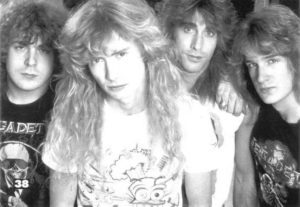
The lyrics are as ill fated as the tragedy that inspired the music. There’s a pleading in Dave’s voice as he sings of lost love and cruel rejection. The emotion cuts so deep that death is deemed a desirable alternative to the pain.
Though Megadeth routinely ignores So Far, So Good, So What in a live setting, “In My Darkest Hour” was the exception. Frequently finding its way into the set list, the composition translates well to the stage. The song’s inclusion in The Decline of Western Civilization Part 2: The Metal Years further cements the legacy of “In My Darkest Hour.”
TESTAMENT – THE BALLAD
Testament excelled at composing slower songs that contrasted with their heavy brand of thrash. Simply titled, “The Ballad,” this standout track from Practice What You Preach just may be the ultimate thrash ballad.
Even without his trusty Ibanez, Alex Skolnick plays clean and precisely. Notes flow effortlessly from an acoustic guitar. He sounds unhindered. Free. No wonder he would later leave Testament to pursue jazz.
Musically, the song is brilliant. Guitars consistently provide melodic interludes between acoustic-driven verses. The drumbeat is a reminder of what has been lost with the departure of Louie Clemente. It’s simple but essential to the feel of the song.
Chuck Billy sounds completely naturally when singing over an acoustic guitar. Of course he truly shines when things gets loud. The second half of the song shifts into pure thrash as Chuck shouts angry words of defiance.
I’VE BEEN ROBBED
I’VE BEEN FOOLED
I INTEND NOW TO MAKE MY OWN RULES!
Again, the feel of Clemente drives the fast passage. Listening to each musician fire on all cylinders proves that Testament easily ranks among the best in the genre.

